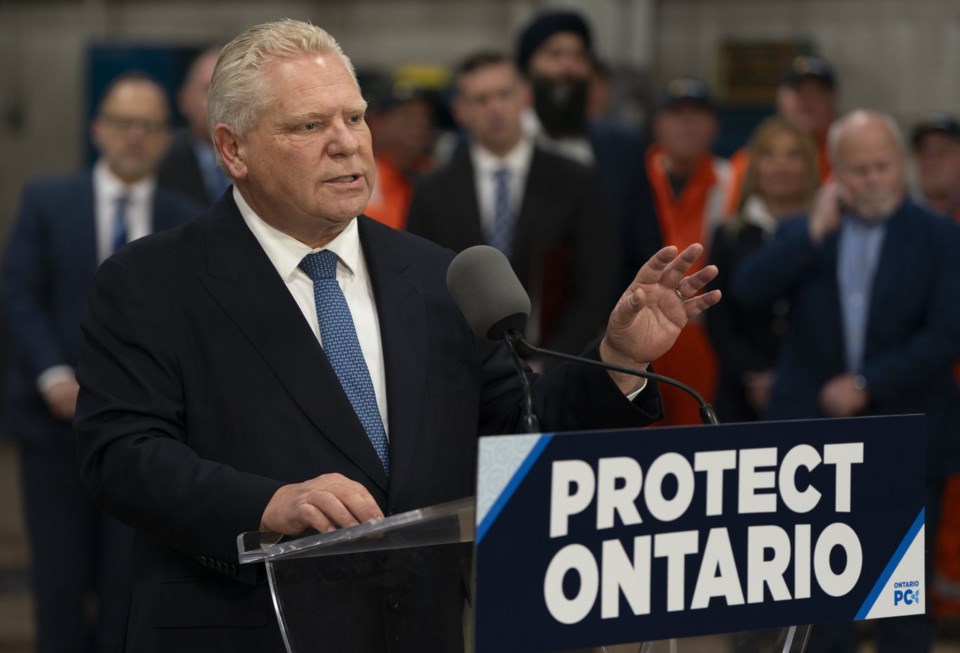OTTAWA — U.S. President Donald Trump said he will not impose tariffs on Mexico this week after he and his Mexican counterpart cut a deal during a phone call Monday morning.
On Saturday, Trump signed executive orders that laid out a plan to hit Canada and Mexico with 25 per cent tariffs on Tuesday, with a lower 10 per cent levy on Canadian energy. He also added another 10 per cent tariff on Chinese goods.
On Monday morning Mexican President Claudia Sheinbaum said that she has agreed to send 10,000 troops to the U.S. border to combat drug trafficking. Mexico first sent troops to its northern border in 2019, citing pressure from the U.S. to curb migration.
Trump said on Truth Social that he's agreed to pause the imposition of tariffs on Mexico for one month to allow for negotiations.
"I look forward to participating in those negotiations, with President Sheinbaum, as we attempt to achieve a 'deal' between our two Countries," Trump said.
Trump also spoke with Prime Minister Justin Trudeau Monday morning and the two leaders are planning a second call later in the day. The Prime Minister's Office provided no details about the first call.
Trudeau said on Saturday that he had been trying to speak directly with Trump since he took over the White House on Jan. 20 but hadn't been able to do so.
Trump relied upon the International Emergency Economic Powers Act to declare an economic emergency that allowed him to bypass Congress and impose the tariffs on his own.
The executive orders say the levies are a response to illegal immigration and drug smuggling. The order related to Canada says Mexican cartels are operating in the country and claims the modest amount of fentanyl intercepted at the northern border would be enough to kill "9.5 million Americans."
Trump also has said repeatedly he thinks tariffs are "beautiful" and claims they can make the U.S. wealthier, despite the short-term pain for businesses and consumers.
Both Canada and Mexico promised to strike back with counter-tariffs over the weekend.
Ottawa's counter-tariff plan would begin on Tuesday with 25 per cent tariffs on $30 billion in goods originating in the U.S.
In three weeks, after consulting with industry, the federal government plans to impose tariffs on another $125 billion in U.S. goods.
Trudeau said additional non-tariff measures are being discussed by the federal and provincial governments, including some related to critical minerals, energy and procurement.
It is not clear what, if anything, Canada could promise to do on its border to convince Trump to reverse course.
Ottawa laid out a $1.3-billion border plan in December that will add personnel, helicopters, drones, drug-sniffing dogs and surveillance towers to the border.
Green Party Leader Elizabeth May said in a statement Monday morning that Trudeau met with opposition leaders to discuss his government's response to the tariff threat.
"The prime minister shared that it had become increasingly clear that there was no evidence or further actions on border security that would make any difference. Trump would only double down. It was not really about fentanyl. It was about Canada and our sovereignty," she said.
"All of us spoke to that point and agreed."
Premiers have laid out plans for their own countermeasures. Several provinces have pledged to stop buying U.S. alcohol and to remove it from the shelves of provincial liquor stores.
Ontario Premier Doug Ford, who is in the midst of an election campaign, announced that he will bar American companies from provincial contracts as long as the tariffs are in place.
He also said he ripped up a $100-million deal with SpaceX's Starlink to bring internet to rural and northern communities. The company is owned by Trump donor Elon Musk; the president has tapped Musk to lead a government efficiency agency.
"I'm not going to support someone that is hell-bent on destroying our province, destroying people's families, taking jobs away from them," Ford said at a campaign announcement on Monday.
Saskatchewan Premier Scott Moe on Monday called for Canada to also send troops to the border to stop illicit drugs from crossing into the U.S.
In a press conference Monday, Moe also reiterated his proposal to bring the Canada Border Services Agency under the military, and said he's asked Public Safety Minister Dominic LeBlanc to consider whether that's possible.
He said a delay in Trump imposing the tariffs would allow leaders to further make the case to stop the measures.
— With files from Allison Jones and Liam Casey in Toronto, Jeremy Simes in Regina and The Associated Press
This report by The Canadian Press was first published Feb. 3, 2025.
Sarah Ritchie, The Canadian Press

